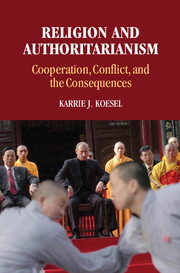Book contents
- Frontmatter
- Dedication
- Contents
- List of Figure, Table, and Illustrations
- Acknowledgments
- 1 Introduction: The Politics of Religion
- 2 Religion and State Games
- 3 Regulating the Religious Marketplace
- 4 The Political Economy of Religious Revival
- 5 The Politics of Faith, Power, and Prestige
- 6 Conclusions: Collaboration and Conflict in Comparison
- Appendix A Methodology and Data
- Appendix B Interviews Cited
- Bibliography
- Index
- References
4 - The Political Economy of Religious Revival
Published online by Cambridge University Press: 05 June 2014
- Frontmatter
- Dedication
- Contents
- List of Figure, Table, and Illustrations
- Acknowledgments
- 1 Introduction: The Politics of Religion
- 2 Religion and State Games
- 3 Regulating the Religious Marketplace
- 4 The Political Economy of Religious Revival
- 5 The Politics of Faith, Power, and Prestige
- 6 Conclusions: Collaboration and Conflict in Comparison
- Appendix A Methodology and Data
- Appendix B Interviews Cited
- Bibliography
- Index
- References
Summary
When it's a question of money, everybody is of the same religion.
– VoltaireThe previous chapter concluded that it is at the local level where the political management of religion largely takes place and, consequently, where the relationship between the autocratic state and religious life is defined. The purpose of this chapter, therefore, is to explore the dynamics of religious and local regime relations to illustrate the varying degrees of cooperation, compliance, and control. This chapter demonstrates that the key points of contact between religious groups and their authoritarian overseers are often based on material, rather than spiritual, concerns. Indeed, what frequently brings the two sides together is a common preoccupation with money.
Transition politics across Russia and China have left local governments and religious communities facing varying degrees of uncertainty. Some of the most pressing concerns are economic, and as a result political elites seek creative solutions that will not only maintain stability and assist in governance, but will also grow the economy. Religious communities also face financial concerns of their own. Since the 1980s, religious groups in Russia and China have been slowly reclaiming property that was confiscated or destroyed by the state. With the return of property, comes the daunting task of rebuilding after decades of neglect. The reality is that much of the property is in a serious state of disrepair or simply too small to accommodate the growing number of worshipers. What is more, religious organizations rarely have the financial means for such large-scale restoration projects. In addition to these financial burdens, religious communities must also navigate bureaucratic red tape to legally reopen places for worship. After all, these are authoritarian political systems where religious freedoms are vaguely defined and selectively protected, and there are no guarantees that religious groups will be able to secure the required permits. These conditions, in short, provide powerful incentives for government officials and religious leaders to trade favors, offer promises of reciprocal support, and above all exchange resources to meet pressing needs.
- Type
- Chapter
- Information
- Religion and AuthoritarianismCooperation, Conflict, and the Consequences, pp. 62 - 116Publisher: Cambridge University PressPrint publication year: 2014



